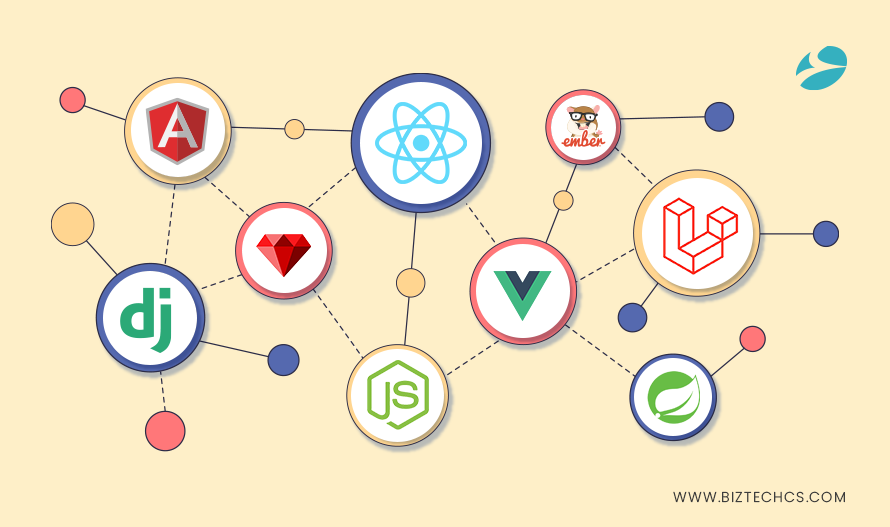
Top Backend Web Development Frameworks in 2023: Empowering Robust Web Applications
Introduction:
In the ever-evolving world of web development, backend frameworks play a crucial role in building powerful and scalable web applications. A robust backend ensures seamless data processing, security, and overall functionality of web applications. As businesses strive to deliver top-notch user experiences, developers are constantly seeking the best backend web development frameworks to meet the demands of modern web applications. In this article, we will explore the top backend web development frameworks in 2023 that are empowering developers to create high-performing and feature-rich web applications. From Laravel and CodeIgniter to Django and Express.js, these frameworks are shaping the future of backend development.
Laravel – The PHP Powerhouse:
Laravel, a PHP-based backend web development framework, has gained immense popularity in recent years. Known for its elegant syntax and expressive features, Laravel has become a top choice for developers building modern and sophisticated web applications. It follows the Model-View-Controller (MVC) architectural pattern, providing developers with a structured approach to application development. Laravel’s extensive feature set, including Eloquent ORM and Blade templating engine, makes it a versatile and powerful framework.
Pros of Laravel:
- Eloquent ORM: Laravel’s Eloquent ORM simplifies database interactions and allows developers to work with databases using an object-oriented syntax.
- Blade Templating Engine: Blade offers a user-friendly templating engine that enhances the creation of dynamic and reusable views.
- Artisan Command-Line Tool: Laravel’s Artisan provides a range of helpful commands to streamline various development tasks.
- Robust Ecosystem: Laravel boasts an extensive ecosystem with a wide array of packages and libraries that can be seamlessly integrated into applications.
- Laravel Mix: Laravel Mix simplifies asset compilation and enhances frontend development.
Django – The Pythonic Backend Framework:
Django, a high-level Python web framework, is renowned for its simplicity and scalability. It promotes rapid development and clean design, making it an ideal choice for building complex and data-driven web applications. Django follows the Model-View-Template (MVT) architectural pattern, which is similar to the MVC pattern. It offers built-in features like an ORM system and a powerful admin interface.
Pros of Django:
- Batteries Included: Django comes with a range of built-in tools and functionalities, reducing the need for external libraries.
- Django ORM: Django’s built-in ORM simplifies database interactions and promotes efficient data management.
- Admin Interface: Django’s admin interface allows developers to manage application data effortlessly.
- Scalability: Django’s scalability and flexibility make it suitable for projects of all sizes, from small startups to large enterprise applications.
- Community and Documentation: Django has a vibrant community and extensive documentation, ensuring continuous support and updates.
CodeIgniter – The Lightweight PHP Framework:
CodeIgniter is a lightweight and easy-to-use PHP framework, known for its speed and simplicity. It offers a small footprint, making it an excellent choice for projects that require quick development and minimal overhead. CodeIgniter follows the Model-View-Controller (MVC) architectural pattern and provides a straightforward approach to building web applications.
Pros of CodeIgniter:
- Lightweight: CodeIgniter’s small footprint ensures faster loading times and efficient performance.
- Easy to Learn: CodeIgniter’s simple and intuitive syntax makes it easy for developers to get started.
- Active Community: CodeIgniter has an active and supportive community that provides constant updates and assistance.
- Excellent Documentation: CodeIgniter offers comprehensive documentation, making it easy for developers to understand and use the framework.
- Flexibility: CodeIgniter allows developers to customize and extend the framework according to project requirements.
Express.js – The Node.js Backend Framework:
Express.js is a minimal and flexible backend web development framework built on Node.js. It is designed for building fast and scalable server-side applications and APIs. Express.js follows a middleware-based architecture, providing developers with the flexibility to create custom middleware for various functionalities.
Pros of Express.js:
- Minimalistic: Express.js is minimalistic, offering a lightweight and streamlined approach to backend development.
- Middleware Support: Express.js allows developers to use middleware functions to handle requests and responses.
- Scalability: Express.js is highly scalable, making it ideal for handling a large number of concurrent requests.
- Speed: Express.js is known for its fast performance and efficient handling of asynchronous operations.
- Active Community: Express.js has a large and active community, ensuring continuous updates and improvements.
Conclusion:
In 2023, backend web development frameworks continue to play a vital role in building robust and feature-rich web applications. Laravel, CodeIgniter, Django, and Express.js are among the top backend frameworks that have gained significant traction in the developer community. Each framework offers unique advantages and strengths, catering to diverse project requirements and developer preferences.
As businesses strive to create innovative and scalable web applications, partnering with a reputable Laravel development company, CodeIgniter development company, Node js development company, python development company, or any other specialized backend web development firm can significantly enhance the success of your projects. These companies offer expertise in their respective frameworks and can provide tailor-made solutions to meet your unique business needs. As you embark on your web development journey, consider the strengths and capabilities of each framework and make an informed decision that aligns with your development goals and vision for your web applications. With the right backend web development framework and the support of a skilled development team, you can build cutting-edge web applications that drive success in the digital landscape.



